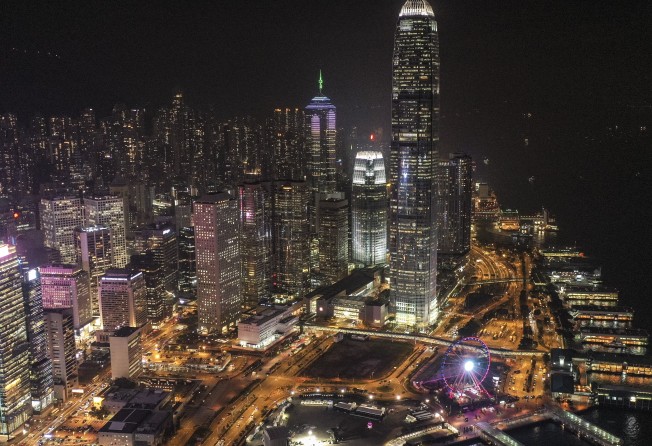Why energy-efficient buildings should lead Hong Kong’s quest to reduce carbon emissions
- Energy sector’s drive to use cleaner fuels will wane by 2030, and shift in policy and incentives is needed
- Overall energy efficiency in the city’s office and residential buildings has not improved since 2008

Hong Kong’s efforts to reduce greenhouse gases should be centred on energy-efficient buildings as the power sector will play a smaller role in cutting emissions in about a decade.
The Business Environment Council, an association of industry players, said the city’s urban environment accounted for 60 per cent of total gas emissions, and any long-term decarbonisation plan would have to incorporate new policy changes and incentives to influence how energy is used in buildings.
“Up to 2030, we all know that the biggest contribution to emissions reductions will come from the power generation sector and switching to a cleaner fuel mix. This is undeniable,” said Simon Ng Ka-wing, the council’s director for policy and research.
“But after 2030, the room for the energy sector to drive further emissions reductions will start to diminish. Other sectors – buildings, transport and even waste management – will have to step up their efforts.”
The government is in the process of consulting the public and drawing up a long-term decarbonisation strategy till 2050, which would be an update of the 2030 climate plan on cleaner fuel for power generation.
According to government data, overall energy efficiency in the city’s office and residential buildings has not improved since 2008.
In a new report, the association proposed 20 policy recommendations to the government, such as the need to improve data transparency and benchmarking standards in buildings’ energy performance, as well as incentivising collaboration between landlords and tenants.
The suggestions were based on a comparative analysis of energy-efficiency policies in seven built-up cities of similar density – Singapore, Tokyo, New York, Sydney, Essen, Beijing and Shenzhen.
Tighter collaboration between landlords and tenants through adoption of “green leases” as exemplified in Sydney and New York, or mandating the open publication of energy performance data like Singapore, should be considered in Hong Kong, the council said.
In its report, the council also found that local landlords were often unwilling to invest in costly retrofitting, while most contracts discourage tenants from having a stake in the matter, because reinstatement clauses require them to restore premises to their original conditions once leases – often short – expire.
Green leases that revise or relax tenancy terms to encourage energy efficiency were found to be rare in Hong Kong.
According to the council, energy audit reports are only submitted to the government every 10 years, making it difficult to compare the latest energy performance between buildings, meaning underperforming structures would not have fresh data to inform management on whether to invest more in energy efficiency.
“This suggests the implementation of a mandatory reporting system for all existing buildings to submit their energy performance data in both shared and tenanted spaces,” the report stated.
“The collected data can then be utilised to develop a set of comprehensive and robust benchmarks published in the right format to maximise their usage.”
Ng said the most important move was for the government to set clear citywide and sectoral targets to reduce emissions till 2050 – something the city lacked.
“Other cities have road maps to get to their target, and may even have interim goals, so everything they do along the way is clear and evidence-based,” he said.
The council – which counts the city’s main utilities, banks, listed conglomerates and property developers as members – will submit recommendations as part of the government’s public consultation this year.
The Environment Bureau says the Council for Sustainable Development will launch the public engagement exercise soon and report to the bureau later this year.
In 2016, existing commercial and residential buildings accounted for 92 per cent of electricity and 95 per cent of gas consumption in the city.
That year, Hong Kong belched out 41.9 million tonnes of greenhouse gases, up 0.5 per cent from 2015.
We will take into account [the council’s] recommendations amongst other views
“We will take into account [the council’s] recommendations amongst other views when developing and rolling out measures to foster a more sustainable built environment in Hong Kong,” an Environment Bureau spokesman said.
The bureau said it had already rolled out a host of measures to promote green buildings and enhance energy efficiency, including expedited tax concessions for investments in energy efficiency installations and a tightening of the Building Energy Code.
A voluntary partnership with developers and property managers to help reduce aggregate electricity saving by 5 per cent between 2015 and 2020 was also in progress. The government has also set its own energy reduction target of 5 per cent from 2015 levels by the 2019-20 financial year.
“The power companies will also play an important role in promoting energy efficiency and conservation,” the spokesman added.
“Under the post-2018 [regulatory framework] with the two power companies, more funds will be made available to support retrofitting, retro-commissioning and use of smart technologies to enhance the energy efficiency of a wider range of buildings.”